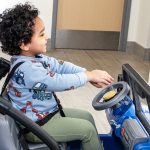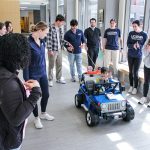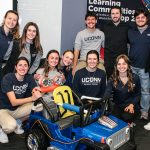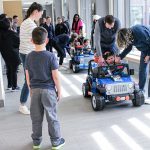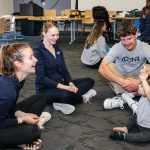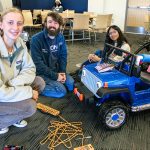Go Baby Go Provides Modified Cars for Children with Disabilities
On Friday, April 4, three children with disabilities received cars custom modified for them by UConn engineering and doctor of physical therapy (DPT) students through the Go Baby Go program.
Go Baby Go modifies commercially available battery-powered cars for children, typically one to five years old, with mobility-related disabilities. These modifications allow the children to control the vehicle independently.
With the cars, these children can better interact with their peers, engage in family activities, and get around more independently.
“Sociability and mobility are the biggest components of the Go Baby Go car,” says Kelly Conte, associated faculty in the Department of Kinesiology in the College of Agriculture, Health and Natural Resources (CAHNR). “You’re allowing them to move and interact with people.”
Mubin Kamran’s son received a car last summer.
“Everyone was so great, so respectful,” Kamran says. “It was the best event. Every parent was happy, every kid was happy.”
Kamran’s son, who is now three, uses his car at the park and playground with his family.
“He loves to ride on it,” Kamran says. “He sits like a boss in the car.”
Based on the needs of the individual child, the team from UConn’s College of Engineering installs an electrical switch that the child can operate with their hand or head to make the car go. There are ropes attached to the car so caregivers can help steer.
Students in the Engineering House Learning Community spend the year working on Go Baby Go. This year, 40 engineering students were involved. Alex Clonan ‘22 (ENG, CLAS) a Ph.D. candidate at UConn, is the project lead.
The students are broken into three teams: an electrical team, a build team, and a design team.
The build team assembles the car out of the box and makes any necessary physical modifications, like adding a roll cage. The electrical team works out the switch mechanism. The design team works on the exterior, personalizing it for each child based on their interests.
“The biggest value for the students is obviously the engineering aspects that are related to this,” Nick Delaney, director of experiential education in the College of Engineering, says. “But more than anything, being able to help a family. It’s their skills and what they’ve learned being delivered directly to a child.”
During the events Go Baby Go holds throughout the year, DPT students make on-site adjustments to ensure the child can sit comfortably and safely in the car. DPT students participate in the event through PT CARES (Community Access to Rehabilitation and Education Services), a free community engagement program run by DPT students and their faculty advisors.
Kelsey Zator ‘26 (CAHNR) is a DPT student who has participated in Go Baby Go twice so far.
“It’s just seeing them be happy, being able to do something for themselves for once and not have to be handled by somebody else,” Zator says.
Ahead of the event, the two student groups meet to tell each other about the modifications they have made or will make on the day of the event.
“I think that interdisciplinary work for a project like this, it adds perspective and particularly for our students, who are sophomores, to get the opportunity to work with doctoral students is really helpful too,” Delaney says.
CAHNR and Engineering have been collaborating on Go Baby Go for the last year. In that time, there have been more than a dozen events with three or four children at each. Prior to the partnership, DPT students and faculty ran the program annually since 2017.
“Dr. Sudha Srinivasan and Dr. Bubela, professors in our program, worked through DPT’s Advanced Pediatrics course,” says Maryclaire Capetta, interim director of physical therapy. “Prior to the Engineering students getting involved, they performed the vehicle modifications themselves.”
Go Baby Go was initially conceived by Cole Galloway, a professor of physical therapy at the University of Delaware, in the early 2000s. Since then, the program has spread throughout the country. Central Connecticut State University (CCSU) has been running their own version since 2015.
Conte collaborates in leading this project with Michele Dischino a CCSU engineering professor; Misty Olsen, an occupational therapist at Quinnipiac University; and Jennifer Rodriguez-MacClintic, a pediatric physical therapist at Connecticut Children’s Medical Center.
“The four of us together have taken on this project of getting cars to as many children as we can,” Conte says.
To get involved with the event, interested families can fill out this application form.
This work relates to CAHNR’s Strategic Vision area focused on Enhancing Health and Promoting Diversity, Equity, Inclusion and Justice.
Follow UConn CAHNR and UConn Engineering on social media
Latest UConn Today
- Inaugural UConn Hunger SymposiumCongresswoman Jahana Hayes Tours UConn Health’s Husky Harvest Food Pantry
- Nursing and Engineering Innovation Forum Highlights Interdisciplinary Work'Just one conversation can open the door'
- UConn Amplifies Sustainability Message with Spring FlingFrom goat yoga to zero-waste barbecue, spreading the message that sustainability is creative and rewarding
- Student Organization Hosts Annual Multicultural Education Conference Focused on Equity and OpportunityOn April 5, Leadership in Diversity held its annual conference at UConn Storrs, offering space for dialogue and discussion among educators across Connecticut
- UConn Firsts: The First Earth DayThe first Earth Day ever held at UConn was also the first Earth Day, ever
- Babbidge Library Exhibit Offers Powerful Images of War, and Hope, Created by Ukrainian Children"Children Draw War, Not Flowers" will be on display at the Homer Babbidge Library through August 1








